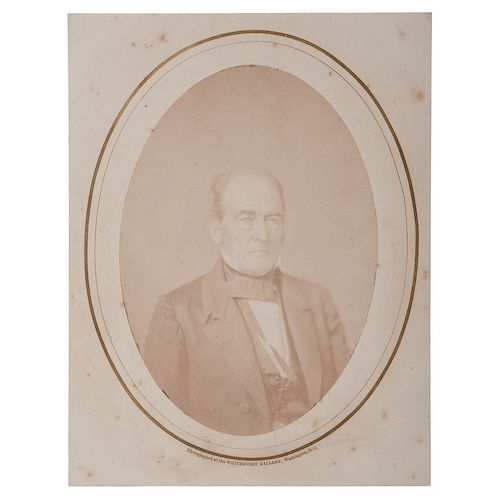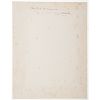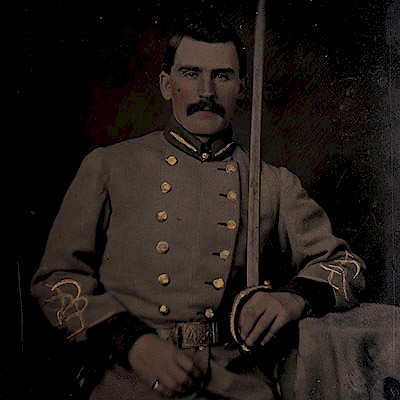John Bell, Constitutional Union Party Candidate for President, Albumen Photograph by Whitehurst
About Seller
6270 Este Ave.
Cincinnati , OH 45232
United States
With offices in Cincinnati, Cleveland and Denver, Cowan’s holds over 40 auctions each year, with annual sales exceeding $16M. We reach buyers around the globe, and take pride in our reputation for integrity, customer service and great results. A full-service house, Cowan’s Auctions specializes in Am...Read more
Two ways to bid:
- Leave a max absentee bid and the platform will bid on your behalf up to your maximum bid during the live auction.
- Bid live during the auction and your bids will be submitted real-time to the auctioneer.
Bid Increments
| Price | Bid Increment |
|---|---|
| $0 | $25 |
| $500 | $50 |
| $1,000 | $100 |
| $2,000 | $250 |
| $5,000 | $500 |
| $10,000 | $1,000 |
| $20,000 | $2,500 |
| $50,000 | $5,000 |
| $100,000 | $10,000 |
About Auction
Jun 22, 2018
Cowan’s American History: Premier Auction, scheduled for June 22, 2018 is comprised of early photographs, documents, manuscripts, broadsides, flags, and more dating from the Revolutionary War, the Civil War, Late Indian Wars, World War I and II and beyond. Cowan's Auctions dawnie@cowans.com
- Lot Description
Oval albumen photograph of Tennessee politician John Bell, 5.25 x 7.25 in., on 7.25 x 9.5 in. mount credited to Whitehurst Gallery, Washington, DC.
John Bell (1796-1869) was an important figure in antebellum politics, serving in the federal government in an array of capacities before vying for the presidency in the critical election of 1860. Bell, like many politicians, began his professional career as a lawyer, graduating from Cumberland College in Nashville in 1814. Bell quickly became involved in the public sector, testing the political waters as a Tennessee State Senator in 1817, and fully immersing himself as a delegate to U. S. House of Representatives ten years later. Amidst Bell's tenure as a Congressman, he began associating with the budding Whig party, where he ascended to leadership positions within the group, including a short-lived appointment as Secretary of War under Whig President William Henry Harrison in 1841. Bell continued representing his native state at a federal level from 1847-1859 when he served as a U. S. Senator while the Whig party controlled the state legislature. His most enduring political legacy, however, remains his candidacy for President of the United States during one of the most important elections in the nation's history.
Representing the ex-Whigs and moderates who formed the Constitutional Union Party, Bell and his running mate, Edward Everett of Massachusetts, were one of the contending tickets in the 1860 election. Bell won majorities in border states such as Kentucky, Virginia, and Tennessee, where his message that secession was unnecessary, due to the Constitution's protection of slavery, resonated with voters. Bell actually met with the newly elected President Lincoln in March of 1861 to discuss such matters. Being a Unionist himself, Bell was staunchly against secession; however, after the events at Fort Sumter the next month, Bell, like so many others, had to make a decision. He sided with the Confederacy, stunning Unionist leaders in the north. Once Tennessee seceded, Bell retired from public life for good, perhaps soured by siding with a cause in which he did not fully believe.
Photograph is somewhat faded, with wear and discoloration at edges, along with age spotting and discoloration to mount.Condition
Eliminate the Hassle of Third-Party Shippers: Let Cowan's Ship Directly To You!
If you'd like a shipping estimate before the auction, contact Cowan's in-house shipping department at shipping@cowans.com or 513.871.1670 x219. - Shipping Info
-
Buyers are required to pay for all packing, shipping and insurance charges. Overseas duty charges are the responsibility of the successful Bidder. Be aware that for larger and/or valuable items, shipping charges can be substantial. - If there is no shipping amount on listed your invoice, you will need to make arrangements to pick up or ship your purchase through an alternative shipping company. Our shipping department can be contacted at 513.871.1670 (ext. 219) or email shipping@cowans.com. - Shipping charges include insurance for your order while in transit. If you have private insurance we will adjust your charge to include only packing and shipping. - Please allow 14 – 21 days after payment to package and ship your purchase as carefully as possible.
-
- Buyer's Premium



 EUR
EUR CAD
CAD AUD
AUD GBP
GBP MXN
MXN HKD
HKD CNY
CNY MYR
MYR SEK
SEK SGD
SGD CHF
CHF THB
THB












